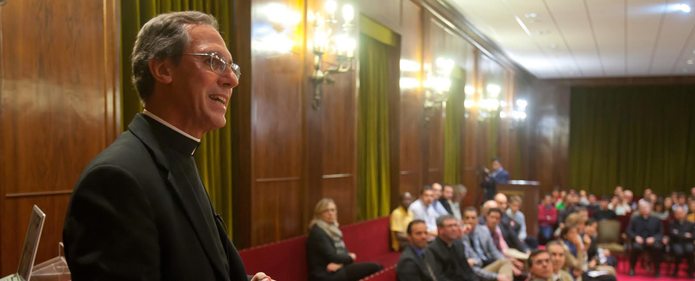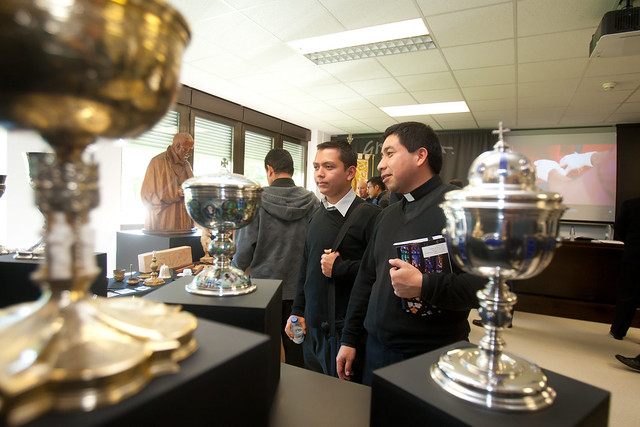Science must look into the windows of Philosophy and Theology.
Interview with Guiseppe Tanzella-Nitti, who delivered the III Mariano Artigas Memorial Lecture

Giuseppe Tanzella-Nitti, astronomer and theologian, is Full Professor of Fundamental Theology at the Pontifical University of the Holy Cross in Rome.
On Tuesday, October 20, invited by the group of research Science, Reason and Faith(CRYF) - founded by the prestigious scientist and priest Mariano Artigas - he was in charge of giving the III Commemorative Lecture that is held every two years. The degree scroll chosen for this occasion was"Is it possible to talk about God in the context of contemporary science?".
Moments before the start of the event at classroom Magna, we had the opportunity to speak with him.
What does it mean for you to deliver this III Memorial Lecture?
An occasion of gratitude to the report of Mr. Mariano Artigas -from whom I have learned many things-, and also to the University of Navarra, an example of dialogue between different disciplines and the search for the unity of knowledge.
Did you know Professor Artigas?
Yes, in 1984. I was studying theology in Rome and he came from time to time to give classes at the newborn School of Philosophy of what would later become the Pontifical University of the Holy Cross.
We immediately started a friendship because when he knew that I had worked for some years in the scientific research and, many of the authors that he knew, I knew them too, a exchange of reflections took place and he began to open horizons for me. He made me see how there was an implicitPhilosophy in many men of science. Our role was to make it explicit and, if necessary, correct it, always appreciating the positive: the search for truth, the passion for research, the recognition of the beauty and intelligibility of nature.
He suggested that I continue to treat my old work colleagues in the field of astronomy and astrophysics by helping them to recognize that all scientific work is, in addition to a very human task, a search for truth.
What are the main problems in the relationship between Theology and Science?
If we talk about the relationship between Theology and Science, what we have to do is to look for a good Philosophy that helps us to dialogue. Part of this is this implicit Philosophy that I have just outlined. Theology also has to make a small effort: without ceasing to be Theology, it should move from theological categories, sometimes a bit closed and self-referential, to more dialoguing categories, which can help in this search for truth, proper to a man of science.
We must also make an effort to use language that is understandable to others and, if necessary, define the meaning and significance of the terms used. With humility. No one, not even the theologian, possesses the total truth. The believer worships the truth and does so in the Triune God, who became man for us in Christ, but this does not mean that he possesses it. Men of science, philosophers and theologians have occasions to walk together towards the truth. But the theologian can teach the star guide of revelation. On this path, on which from time to time one stops, falls down and has to change direction, the theologian has the very word of God that comes to meeting of man. And the man of science and the philosopher can help to recover the right direction, but this does not exempt from the fatigue of continuing to walk.
How to talk about God in the world of science?
In the scientific method and in the activity of the man of science, as a human activity staff, there are openings, points of connection with transcendence. Professor Artigas used to speak of presuppositions in the scientific work . We can also speak of openings. I especially like the image of the windows. The scientific work is a house where the method governs the way of living in that house, what can be done and what cannot. The method, the praxis, rules. But that house has windows that allow one to look outside. The windows as such belong to the house. Those openings, those hooks, are part of the everyday work , but to see what lies beyond requires the effort of leaning out of the window and, in doing so, the scientist does not lose his rationality. He does not stop being a good scientist, he does not change his activity: he is still a man, a man in search of truth.
In and from the University of NavarraProfessor Tanzella-Nitti ended with these words: "at the University of Navarra you have the opportunity for scholars from different disciplines to search for the truth together, because there is a lot of good will. The scientific work that is done here -in a broad sense- is not a reductionist work , nor self-referential, nor materialistic. It is made with passion. And this passion can and should guide the dialogue of all, even with Theology. From the School of Theology you can indicate that star guide of which I have spoken before. You have the opportunity to work together, to make a rigorous interdisciplinarywork , not improvised, not simply mediatic in the poorest sense of the term. And thus arrive at results that enrich Science, as well as Philosophy and Theology. Without this dialogue each of these disciplines would be poorer".

